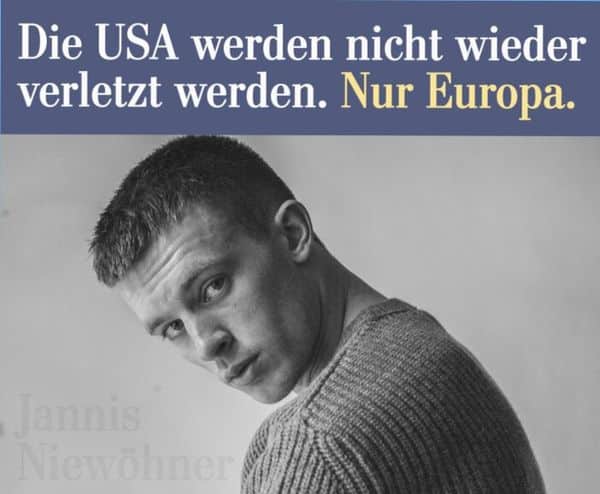The claim
A sharepic spreads a fake quote from Jannis Niewöhner that falsely attributes him to having spoken about the USA and Europe. This statement is an example of deliberate misinformation.
Our conclusion
The circulating quote is fictional and was never made by Jannis Niewöhner. It is part of a paid advertising campaign aimed at disinformation.
At a time when social media is the primary source of news and information for many people, the spread of misinformation is a serious problem that can have a lasting impact on public opinion and trust in the media. A recently uncovered case in which a fabricated quote was attributed to German actor Jannis Niewöhner shows how easily misinformation can be spread to sow doubt and confusion.
What is it actually about?
A sharepic circulating on social networks, particularly Facebook, shows actor Jannis Niewöhner along with a quote claiming he said: “The US will not be hit again. Only Europe.” However, this claim is fictitious. Despite its widespread use, there is no evidence that Niewöhner ever made such a statement. The spread of the fake quote appears to be part of an organized campaign aimed at spreading misinformation and potentially promoting certain political agendas.

Our assessment of the fake quote
The speed and reach at which such fake quotes spread is worrying. They use the popularity and credibility of celebrities to establish false narratives. In the case of Jannis Niewöhner, a spokeswoman clearly confirmed that the quote never came from him. The targeted placement of this Sharepic as an advertisement on Facebook, which was specifically aimed at users in major German cities, shows that there is a financed and possibly coordinated intention behind its distribution.
Facts about the made-up quote
A search for the exact wording of the quote does not produce any results, which confirms that the quote is fictitious. The ads spreading the Sharepic come from Facebook pages with arbitrary names and no apparent legitimate presence, making it difficult to identify those responsible. This method is reminiscent of previous disinformation campaigns involving pro-Russian propaganda and raises questions about the underlying intentions and possible links to state-sponsored disinformation efforts.
Frequently asked questions and answers
| Ask | Answer |
| How can you tell if a quote is real? | Check the source of the quote and look for confirmation in trusted media or official statements from the person in question. |
| Why do campaigns use fake celebrity quotes? | They use the credibility and popularity of celebrities to make their misinformation appear more credible. |
| What is the goal of such misinformation campaigns? | They aim to manipulate public opinions, cause confusion and promote political or social agendas. |
| How was the fake quote distributed? | Through targeted Facebook advertising campaigns that targeted users in specific regions. |
| Is there a way to identify the authors of such campaigns? | It's often difficult, but reviewing the social media ad library and identifying patterns can provide clues. |
Conclusion to the made-up quote
This incident highlights the need to be critical of information shared online, particularly when attributed to celebrities. The spread of false information can have serious consequences by influencing public opinion and undermining trust in the media. It is important that users check sources and be skeptical of unsubstantiated claims.
Source: dpa
Subscribe to our newsletter to stay up to date. Also explore our extensive media education offering .
You might also be interested in:
Dating apps as love traps of a special kind: spying against one's will
Fake quote from Meryem Uzerli
Warning about fake letters from the city of Vienna
Notes:
1) This content reflects the current state of affairs at the time of publication. The reproduction of individual images, screenshots, embeds or video sequences serves to discuss the topic. 2) Individual contributions were created through the use of machine assistance and were carefully checked by the Mimikama editorial team before publication. ( Reason )

